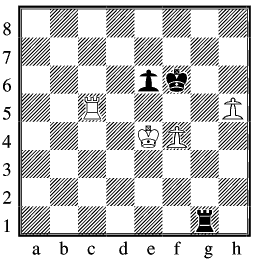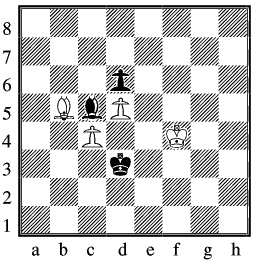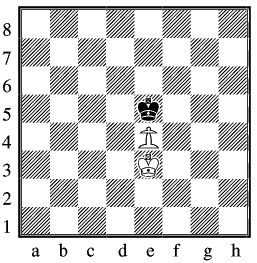
The full Laws of chess, including those applying to quickplay finishes can be found on the FIDE site. I have also created a page of comments on some of the changes for July 2005.
Here I summarise three less well understood situations
Each player is required to record his own moves and those of his opponent , move after move, as clearly and legibly as possible,
Added for July 2005: It is forbidden to write the moves in advance, unless the player is claiming a draw according to Article 9.2 or 9.3.
Fide rules stipulate algebraic notation, but any standard notation is acceptable for our purposes. Opponents of complete beginners in club matches are usually happy to allow the beginner simply to keep track of the number of moves by entering ticks on the scoresheet, but the beginner is still best advised to learn how to record as soon as possible.
A player may reply to his opponent's move before recording it, if he so wishes. He must record his previous move before making another.
Both players must record the offer of a draw on the scoresheet.
Use = to denote a draw offer. This part of the rule is frequently ignored, but is useful in tournament play if you wish to demonstrate that your opponent is distracting you by making frequent offers.
8.4
If a player has less than five minutes left on his clock 8.1 does not apply.
8.5
If only one player is not required to keep score under Article 8.4 he must, as soon as either flag has fallen, update his scoresheet completely before moving a piece on the chessboard. Provided it is the player's move, he may use his opponent's scoresheet, but must return it before making a move
A player wishing to offer a draw shall do so after having made a move on the chessboard and before stopping his clock and starting the opponent's clock. An offer at any other time during play is still valid, but Article 12.5 (which forbids distracting an opponent) must be considered. In both cases the offer cannot be withdrawn and remains valid until the opponent accepts it, rejects it orally, rejects it by touching a piece with the intention of moving or capturing it, or the game is concluded in some other way.
It is clear that the correct sequence is play a move on the board, make the offer, press the clock.
You can claim when it is your move if your opponents last move recreates a position for the third time, or if your intended next move would recreate the same position for a third time. In the latter case you record the move and claim, but do not play it.
Same position means not only that the pieces are identically placed, but that the same player is to move and that the same moves are available (so need to consider legallity of castling, even if temporarily not available, of both players and en passant captures).
9.3 The 50 move rule
You can claim when it is your move if the last 50 consecutive moves have been made by each player without a pawn move or piece capture, or if your intended next move would create such a situation. In the latter case you record the move and claim, but do not play it.
10.2 (The 2 minute rule)
Note that I've made another stab at discussing 10.2 here
In quick play finishes
A player having the move and less than 2 minutes on his clock may claim a draw if his opponent is making no effort to win by normal means (i.e. is simply running the clocks down), or if it is not possible to win by ordinary means. He should stop both clocks and make the claim.
Note that it is necessary to make the claim before your flag falls. Should the game continue you should try to make moves in your time rather than simply letting your last 2 minutes expire. It may be politic to make an offer before claiming (even though a claim also constitutes an offer under the laws) - some players are more amenable to offers than claims, and anything that avoids the possibility of dispute cannot be bad.
Clearly an arbiter may be needed to determine the validity of the claim (who may require that the game continue until flag fall before making a ruling on the result). Games where no arbiter is present are covered by Appendix D to the laws (this will be the case in league and many county matches):
D. Quickplay finishes where no arbiter is present in the venue.
Where games are played as in Article 10, a player may claim a draw when he has less than two minutes left on his clock and before his flag falls. This concludes the game.
He may claim on the basis
a) that his opponent cannot win by normal means, and/or
b) that his opponent has been making no effort to win by normal means.
In (a) the player must write down the final position and his opponent verify it.
In (b) the player must write down the final position and submit an up-to-date scoresheet, which must be completed before play has ceased. The opponent shall verify both the scoresheet and the final position.
The claim shall be referred to an arbiter whose decision shall be the final one.
Under (a) the arbiter is not concerned with what could/would happen with best play, or whether the claimant can describe verbally the necessary technique to secure the draw in the given position. The claim will only succeed if the position is essentially dead.
Under (b) the claim will only succeed if the arbiter deems that the non-claimant is making moves the sole object of which is to waste time, or has shown by the moves made that they have no idea how to make progress.
Since the claimant is short of time his scoresheet may well not be uptodate. However he should be allowed to update it from his opponents. Where both players are short of time and no complete record is available only claims under the first part of the rule are available. Normally the bias is going to be against the claimant. ie unless it is clear that draw is the correct outcome the claim will fail. However if no record is available because the non-claimant failed to keep score even though they had more than 5 minutes on their clock I would not be surprised to learn that a more sympathetic view of the claim would be taken.
 | White has unsuccessfully tried to advance his king or exchange rooks. Changing tack the game continues 1 Kd3, Rg4, and black being short of time claims a draw. However the position is still very much alive as 2 Rc8 might be followed by Rxf4. Now 3 Rf8+ wins as black cannot save his rook and stop the h-pawn. Of course after 2 ... Rh4 white probably has nothing better to do than shake hands. However this is not relevant. Rxf4 is not an unreasonable error. The draw claim should in my opinion fail. |
| The position on the right is essentially dead despite whites extra pawn. It would be unreasonable to expect black to put his bishop en prise or find some other way of losing. A claim for a draw by black should succeed. |  |
 | Less clearcut is this standard drawn position. At which point should black be able to successfully claim a draw? Play goes 1 ... Ke6, 2 Kd4 Kd6, 3 e5+ Ke6, 4 Ke4 Ke7, 5 Kd5 Kd7, 6 e6+ Ke7, 7 Ke5 Ke8. Seen (more than) enough to know that black knows how to draw? We might expect 8 Kd6 Kd8, 9 e7+ Ke8, 10 Ke6 ½-½. But do we know that blacks plan isn't "blockade the pawn if possible, if not go to the same file as whites king"? If he is thinking this way then 8 Ke4 Ke7 (the first part of blacks thoughts) and 9 Kd5 will prompt the fatal 9 ... Kd8, 10 Kd6 Ke8, 11 e7 Kf7 (forced), 12 Kd7 1-0. Whilst I think white should have a chance to try this latter line if he wishes before black can successfully claim a draw, I may well not be in the majority. However I suspect that many experienced whites would happily take the draw anyway. |